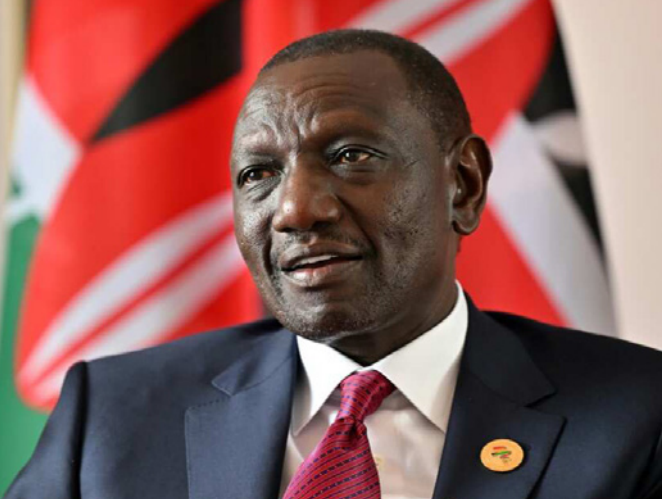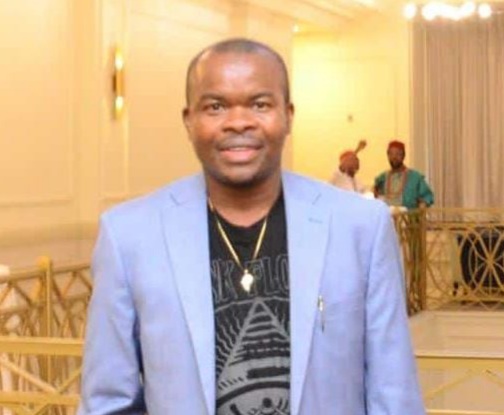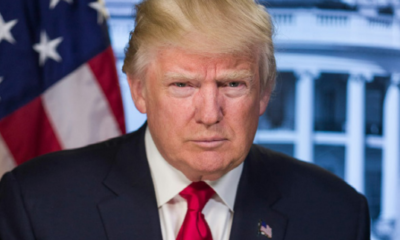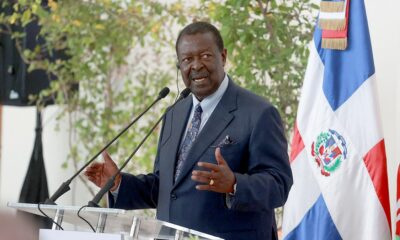Business
Kenya: Ruto Says Borrowing Only Way To Plug Deficit

Kenyan President William Ruto has announced that the country will seek additional borrowing to address its growing budget deficit. This decision comes after the rejection of a finance bill that aimed to increase tax revenue.
The finance bill was rejected following protests against tax increases. Despite the protests, lawmakers approved the bill, but President Ruto declined to sign it and instead withdrew it from parliament.
Ruto stated in a TV interview that the failure to pass the finance bill has hindered efforts to reduce Kenya’s debt burden. Currently, approximately 60% of the country’s revenue is allocated towards servicing debt.
The new taxes proposed in the finance bill were expected to generate around $2.7 billion in revenue. Instead, the government plans to borrow one trillion Shillings ($7.6 billion) to fund social services and programs.
K e n y a ‘ s current debt stands at over $80 billion, with a significant portion denominated in foreign currency. In a separate development, President Ruto has emphasized the need for the African Union (AU) to achieve financial autonomy and reduce its dependence on external partners. He highlighted that less than 40% of AU member states pay their annual contributions, resulting in a significant reliance on international partners for funding.
This move to increase borrowing has sparked concerns about Kenya’s growing debt burden and its ability to manage its finances effectively. The government’s decision to resort to borrowing to address its budget deficit has raised questions about the long-term sustainability of this approach.
Analysis
Nigeria’s Tax Reforms and the Diaspora, by Boniface Ihiasota

Nigeria’s Tax Reforms and the Diaspora, by Boniface Ihiasota
For Nigerians living abroad, tax policy at home has often felt distant, until the recent overhaul of Nigeria’s tax framework brought it sharply into focus. The passage of the Nigeria Tax Act, which took effect from January 1, 2026, triggered anxiety across diaspora communities, fuelled largely by fears that earnings abroad or personal remittances would now attract Nigerian tax. A closer reading of the reforms, however, shows that Nigeria is not charting a radical or punitive course against its diaspora. Instead, it is aligning more closely with internationally accepted principles of taxation based on residency and income source.
At the heart of the reform is a clearer definition of tax residency. Under the new framework, individuals who spend 183 days or more within Nigeria over a 12-month period, or who maintain a permanent home or substantial economic ties in the country, are considered tax residents. Only such residents are liable to tax on their worldwide income. Nigerians who live and work abroad and do not meet these conditions remain non-residents and are taxable in Nigeria only on income sourced within the country. This distinction is critical because it dispels the widespread notion that citizenship alone now triggers tax liability.
The Federal Government, through the Presidential Fiscal Policy and Tax Reforms Committee, has repeatedly clarified that income earned abroad by non-resident Nigerians is not subject to Nigerian tax, even when such income is remitted home. Remittances sent to family members for upkeep, education, healthcare or personal support are not classified as taxable income. This position is particularly significant given that Nigeria received an estimated $20.5 billion in diaspora remittances in 2023, according to World Bank data, making it one of Africa’s largest recipients. Taxing such flows would not only have been impractical but economically counterproductive.
When viewed in a global context, Nigeria’s approach is far from unusual. Most countries operate either a residence-based or source-based tax system. In the United Kingdom, for instance, non-residents are taxed only on UK-sourced income, such as rental income from property located in Britain. Canada applies similar rules, taxing non-residents only on income earned within Canada, while residents are taxed on worldwide income. China also follows a residency threshold of 183 days, beyond which global income becomes taxable. Nigeria’s reforms fit squarely within this international pattern.
Only a handful of countries take a different approach. The United States is the most prominent example, taxing citizens on their worldwide income regardless of where they live. U.S. citizens abroad are required to file annual tax returns and comply with foreign account reporting rules, though credits and exclusions exist to mitigate double taxation. Eritrea operates a similar system, levying a two per cent diaspora tax on its citizens overseas. Nigeria has explicitly rejected this model, opting instead for a system that balances revenue generation with global mobility and fairness.
Where tax obligations do arise for Nigerians in the diaspora is in relation to Nigerian-sourced income. Rental income from property in Abuja or Lagos, dividends from Nigerian companies, or profits from businesses operating within Nigeria remain taxable, regardless of where the individual resides. In many cases, such taxes are collected through withholding mechanisms and treated as final, reducing administrative burdens on non-residents. This is consistent with global practice and reflects the principle that income should be taxed where economic value is created.
The reforms also strengthen Nigeria’s use of Double Taxation Agreements, which the country has signed with several nations including the United Kingdom, Canada, China and South Africa. These treaties are designed to prevent the same income from being taxed twice and to provide clarity on taxing rights between countries. For Nigerians abroad who may still qualify as tax residents due to time spent at home or strong economic ties, these agreements offer essential safeguards.
Beyond individual taxation, the reforms signal a broader shift in Nigeria’s fiscal strategy. By simplifying tax laws, adjusting personal income tax thresholds and expanding digital compliance systems, the government aims to widen the tax net without placing undue pressure on vulnerable groups or discouraging diaspora engagement. For Nigerians abroad, this clarity matters. Many invest in property, startups and family enterprises back home, and uncertainty around taxation has long been a deterrent.
Ultimately, the significance of Nigeria’s tax reforms for the diaspora lies not in new burdens, but in clearer rules. They reaffirm that Nigerians abroad are not taxed simply for being Nigerian, nor for supporting families at home. Instead, tax obligations are tied to presence, economic activity and income source, in line with global norms. For a country whose diaspora plays a vital role in economic stability and development, this alignment is not just sensible policy, but a necessary reassurance.
Business
Zenith Bank, Excel Global Media Discuss Strategic Partnership

Zenith Bank, Excel Global Media Discuss Strategic Partnership
Zenith Bank Plc has opened discussions with Excel Global Media Group Inc., United States, on ways to strengthen engagement with Nigerians in the diaspora.
The talks, which took place at the bank’s corporate headquarters in Lagos, were led by Chika Uche-Okeke, Head-Diaspora Banking, IMTOs and Creative Industry Department, who received the publisher of Excel Global Media Group, owners of Excel Magazine International and Diaspora Watch Newspaper, Boniface Ihiasota.
The meeting focused on the role of credible media platforms in boosting visibility and fostering trust among Nigerian communities abroad.
During the engagement, both parties examined the economic and strategic importance of the diaspora, particularly in the United States, where remittances and investments contribute significantly to Nigeria’s external inflows.
The discussion also highlighted the potential of structured media partnerships to communicate the bank’s products, services, and corporate values to a broader international audience.
Uche-Okeke noted that any media collaboration would align with the institution’s corporate strategy and governance framework.
She emphasised that diaspora-focused initiatives are critical in reinforcing the bank’s brand, building loyalty, and sustaining professional relationships with Nigerians living overseas.
The meeting concluded with an agreement to explore a framework for ongoing media engagement, aimed at enhancing Zenith Bank’s outreach in key diaspora markets, while leveraging Excel Global Media Group’s established platforms for targeted publicity and information dissemination.
Business
Tesla Loses Top Spot as BYD Overtakes in Global EV Sales

Tesla Loses Top Spot as BYD Overtakes in Global EV Sales
Tesla has reported lower-than-expected vehicle sales in the fourth quarter of 2025, losing its position as the world’s largest electric vehicle (EV) maker by annual sales to Chinese auto giant, BYD.
The American EV manufacturer, led by billionaire entrepreneur Elon Musk, said it delivered 418,227 vehicles in the final three months of 2025, bringing its total deliveries for the year to about 1.64 million units.
In contrast, a day earlier, Shenzhen-based BYD announced that it sold 2.26 million electric vehicles in 2025, overtaking Tesla to emerge as the global market leader in EV sales.
Analysts had projected a stronger performance from Tesla in the fourth quarter, with a FactSet consensus estimating deliveries of about 449,000 vehicles.
The shortfall has heightened concerns over slowing demand for electric vehicles, particularly in the United States.
Industry analysts noted that the removal of the $7,500 federal EV tax credit at the end of September 2025 has continued to weigh on consumer demand in the US market, with the sector yet to find a new equilibrium.
However, observers point out that Tesla’s sales challenges predated the policy change, as the company had already been struggling in some key markets.
This, analysts said, was partly linked to the political activities of its chief executive, Elon Musk, including his public support for US President Donald Trump and other far-right politicians, which reportedly affected consumer sentiment.
Tesla is also facing intensifying competition from Chinese manufacturers, particularly BYD, as well as from established European automakers ramping up their EV offerings.
BYD, which produces both fully electric and hybrid vehicles, on Thursday disclosed that it recorded its highest-ever EV sales in 2025, underlining the growing dominance of Chinese firms in the global electric vehicle market.
The development signals a major shift in the rapidly evolving EV industry, with analysts predicting stiffer competition and further pressure on global automakers in the coming year.
-

 Business5 days ago
Business5 days agoZenith Bank, Excel Global Media Discuss Strategic Partnership
-

 News5 days ago
News5 days agoTrade, Tension as Trump Threatens US–Canada Bridge Opening
-

 News5 days ago
News5 days agoSenegal Police Arrest 14 in Transnational Paedophile Ring Linked to France
-

 News5 days ago
News5 days ago55 Migrants Perish as Boat Overturns Off Libyan Coast
-

 Analysis5 days ago
Analysis5 days agoNigeria’s Tax Reforms and the Diaspora, by Boniface Ihiasota
-

 News5 days ago
News5 days agoKenya to Engage Russia Over Illegal Recruitment of Citizens for Ukraine War










